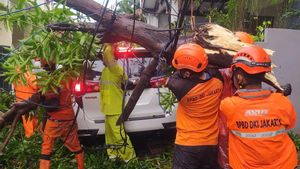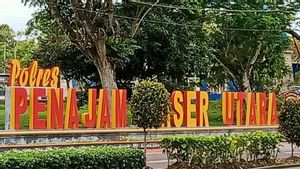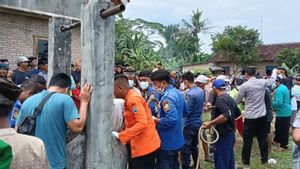YOGYAKARTA - Often heard by the crime scene, whether it's on social media, news, or in the environment around us, then what does the crime scene mean?
According to a journal from UNNES quoted by VOI, the efforts that investigators can take to obtain information, instructions, or evidence regarding the crime that occurred were by processing the crime scene or crime scene.
Indonesia as a state of law has realized many laws and regulations. One of the laws and regulations is Law no. 8 of 1981 concerning the Criminal Procedure Code (KUHAP).
The Criminal Procedure Code contains a series of rule laws that contain procedures/events in case of a crime. In the procedure/event it must be through the implementation of evidence. In collecting the means of proving a crime, the police have a really important role in dismantling a case.
This is because ex-officio of the police is the investigator on duty and has the authority to carry out an investigation and collect evidence to a moment or incident that is suspected to have a criminal act.
Along with the advanced era, criminals are also increasingly good at carrying out criminal acts. Criminal actors are increasingly sophisticated in disguising or eliminating evidence.
Paying attention to this situation will be difficult to obtain the evidence needed, and conventional investigation methods that only rely on the confession of the suspect/un ideal witness if applied at this time, because it is possible that the suspect who claims to be the real perpetrator or the witness who claims to not say the truth is because they are forced or under threat.
If that happens, there has been a deviation from the purpose of criminal procedural regulations, and the investigator's method is the most ideal to find and find out whether a crime has occurred at a moment that is suspected to be a criminal act, namely the method of processing the crime scene.
The basis of TKP Law
Referring to the Regulation of the Head of the Indonesian National Police Number 14 of 2012 concerning Management of Criminal Investigations (Perkapolri 14/2012).
Based on Article 12 paragraph (1) of Perkapolri 14/2012, the investigation activities include:
The activities in processing the crime scene include (Article 24 letter a of Perkapolri 14/2012):
Another stipulation that controls the processing of the crime scene is the Rules of the Head of the National Police of the Republic of Indonesia Number 6 of 2010 Regarding Investigating Management by Civil Servant Investigators (Perkapolri 6/2010) which is reported from the legal website of the National Legal Development Agency (BPHN). From this rule, it is known that the party who has the authority to carry out crime scene processing is not only the Police but also Civil Servant Investigators (PPNS).
In the context of processing the crime scene, the actions carried out by PPNS are as follows [Article 20 paragraph (1) of Perkapolri 6/2010]:
So that's the understanding of crime scene processing, see other interesting news only on VOI, it's time to revolutionize news!
The English, Chinese, Japanese, Arabic, and French versions are automatically generated by the AI. So there may still be inaccuracies in translating, please always see Indonesian as our main language. (system supported by DigitalSiber.id)













